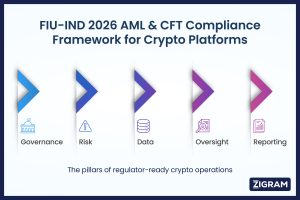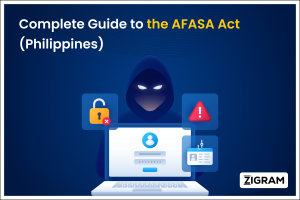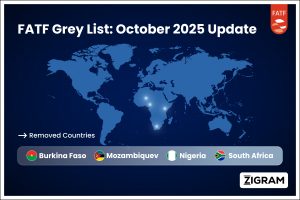India’s FATF 2024 Mutual Evaluation Report offers a thorough analysis of the country’s anti-money laundering (AML) and counter-terrorist financing (CFT) measures. While significant advancements are recognized, key areas require improvement to enhance India’s compliance with global standards.

Overview Of India AML/CFT Framework
India has steadily reinforced its AML/CFT framework, especially in aligning with FATF’s 40 Recommendations. According to the report, “India’s AML/CFT system is effective in many respects, especially in terms of risk understanding, national coordination, and financial intelligence utilization”. This demonstrates the nation’s growing compliance with FATF standards, particularly in its risk-based approach and supervision.
The Enforcement Directorate (ED) plays a critical role in investigating money laundering (ML) offenses, with significant support from the Financial Intelligence Unit India (FIU-IND). The FIU-IND’s ability to provide actionable data has strengthened the overall anti-money laundering in India system by supporting investigations into predicate crimes like fraud and corruption.
Strengths In Financial Intelligence And Asset Seizures
India’s Financial Intelligence Unit India (FIU-IND) is central to the collection, analysis, and dissemination of financial data for AML and CFT purposes. According to FATF, “financial intelligence supported the operational needs of competent authorities to a significant extent”. This has significantly improved financial intelligence in India.
In addition to financial intelligence, India has demonstrated strength in asset seizure in money laundering cases. FATF commends that “significant quantities of proceeds are attached by LEAs at the early stages of investigations, helping deprive criminals of proceeds and preventing asset flight”. These early-stage asset seizures play a vital role in preventing criminals from moving illicit gains and ensuring more effective prosecution.
Key Strengths
- Strong AML/CFT framework compliant with global standards.
- Effective collaboration between Financial Intelligence Unit India (FIU-IND) and law enforcement agencies.
- Early asset seizure processes prevent criminals from moving funds internationally.
- Enhanced data analysis for financial crime investigations.
Key Challenges: Judicial Delays In Money Laundering Cases
While India has made significant strides, judicial delays pose a major challenge to anti-money laundering in India. The FATF 2024 Mutual Evaluation Report highlights a “large backlog of pending cases”, which severely hampers AML prosecutions. The report further states that, while “prosecutions and convictions have started to increase, the backlog of pending cases remains considerable”. These judicial delays in money laundering cases are a significant concern, as they slow the pace of convictions and impede the confiscation of criminal proceeds.
In addition, the Enforcement Directorate (ED) has struggled with effectively prosecuting offenses related to human trafficking and drug trafficking, despite its success in tackling fraud and forgery cases. This limits India’s ability to curb money laundering in some high-risk sectors.
Key Challenges
- Backlog of pending trials in money laundering (ML) cases.
- Slow pace of criminal proceeds confiscation.
- Judicial delays impact the effectiveness of ML case resolutions.
Addressing Terrorist Financing Risks In India
India has made commendable progress in tackling terrorist financing risks. According to FATF, “TF investigations are broadly conducted in line with the risks identified,” but the report cautions about “significant delays in prosecutions. This backlog affects India’s ability to swiftly convict those involved in terrorist financing (TF), limiting the overall effectiveness of the judicial process.
FATF also raises concerns about the non-profit organization (NPO) sector, as it remains vulnerable to terrorist financing risks in India. While the government has engaged with NPOs to minimize risks, FATF suggests more focused outreach to high-risk NPOs. These NPOs need better education on risks and controls to prevent misuse for financing terrorist activities.
Key TF Challenges
- Delayed prosecution of terrorist financing (TF) cases.
- Vulnerabilities in the non-profit organization (NPO) sector for TF abuse.
- Engagement with NPOs needs to focus on high-risk entities.
Improving Supervision Of Designated Non-Financial Businesses And Professions (DNFBPs)
The FATF report also emphasizes the need for improving supervision of Designated Non-Financial Businesses and Professions (DNFBPs). While Virtual Asset Service Providers (VASPs) and DNFBPs are now subject to AML/CFT obligations, FATF notes that supervision is still underdeveloped in high-risk sectors like precious metals and stones.
To address these issues, FATF recommends improving suspicious transaction reporting in India. Particularly, India must enhance its risk-based supervision for DNFBPs and focus on high-risk sectors to better detect suspicious activity and increase the number of Suspicious Transaction Reports (STRs) filed.
Key Recommendations
- Enhance supervision of DNFBPs and VASPs.
- Increase suspicious transaction reporting (STR) for high-risk sectors.
- Strengthen regulatory enforcement in sectors vulnerable to money laundering.
Recommendations For Enhanced International Cooperation
India has made notable strides in international cooperation. FATF commends the country for improving its response to mutual legal assistance (MLA) requests and streamlining processes with an online portal. However, FATF suggests further improvements in the quality of MLA requests to ensure more effective cooperation on cross-border investigations.
India’s financial supervisors have been proactive in seeking international cooperation, especially for fit and proper checks in the financial sector. By continuing these efforts, India can strengthen global collaboration in combating financial crimes.
Key Cooperation Areas
- Improve the quality of MLA requests for more efficient cross-border collaboration.
- Enhance international cooperation in financial crime investigations.
- Strengthen fit and proper checks for financial institutions.
Conclusion
The FATF 2024 Mutual Evaluation Report underscores both the strengths and challenges in India’s AML/CFT framework. While India has made significant progress, particularly in improving financial intelligence and asset seizure in money laundering cases, judicial delays and gaps in prosecuting money laundering and terrorist financing risks in India remain critical areas for improvement.
By addressing these challenges—especially the backlog of cases, enhancing supervision of DNFBPs, and improving suspicious transaction reporting in India—the country can better align with FATF’s global standards. With continued reforms in the judicial system and financial supervision, India can solidify its position as a global leader in combating money laundering and terrorism financing.
- #aml
- #cft
- #India
- #FATF
- #MutualEvaluationReport2024







